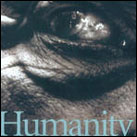Humanity: A Moral History of the Twentieth Century
 Why I am recommending this book:
Why I am recommending this book:
Glover discusses the "why" of our inhumanity as a way of offering hope of a more humane existence. In light of many of the events taking place in the world today, this is a relevant and important examination.
Click here to purchase this book.
Amazon.com:
In Humanity, English ethicist Jonathan Glover begins with the now commonplace observation that the last 100 years were perhaps the most brutal in all history. But the problem wasn't that human nature suddenly took a sharp turn for the worse: "It is a myth that barbarism is unique to the twentieth century: the whole of human history includes wars, massacres, and every kind of torture and cruelty," he writes. Technology has made a huge difference, but psychology has remained the same--and this is what Glover seeks to examine, through discussions of Nietzsche, the My Lai atrocity in Vietnam, Hiroshima, tribal genocide in Rwanda, Stalinism, Nazism, and so on.
There is much history here, but Humanity is fundamentally a book of philosophy. In his first chapter, for instance, Glover announces his goal "to replace the thin, mechanical psychology of the Enlightenment with something more complex, something closer to reality." But he also seeks "to defend the Enlightenment hope of a world that is more peaceful and more humane, the hope that by understanding more about ourselves we can do something to create a world with less misery." The result is an odd combination of darkness and light--darkness because the subject matter of the 20th century's moral failings is so bleak, light because of Glover's earnest optimism, which insists that "keeping the past alive may help to prevent atrocities." He cites Stalin's bracing comment, made while signing death warrants: "Who's going to remember all this riff-raff in ten or twenty years' time? No one." At one level, Humanity is a book of remembrance. But it's more than that: it's also an attempt to understand what it is in the human mind that makes moral disaster always loom--and a prayer that this aspect of our psychology might be better controlled.
Click here to purchase this book.
